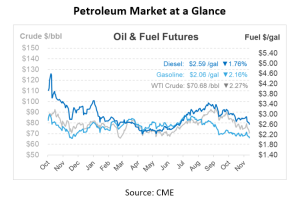
What is it – Environmental, Social, and Governance (ESG)
More and more companies are taking the necessary steps to reduce greenhouse gas emissions and offset the progress of climate change across the globe. The achievement of these goals and objectives is deeply rooted in accountability, which is why frameworks for ESG and reporting have been established. Now, you may be wondering what ESG is and how that relates to your sustainability goals. Today’s What Is It Wednesday will cover just that and more.
What is ESG?
ESG, short for Environmental, Social, and Governance, is the triad of metrics used to determine the extent to which a corporation aligns with socially conscious values. When dissecting the ESG acronym, each letter represents a distinct facet of company operations:
Environmental: How is the company mitigating its carbon footprint? Are they on the pathway to net-zero emissions? The “E” takes into account a company’s usage of natural resources and the environmental impact of its operations. It covers all of a company’s supply chain operations in addition to its direct operations.
Social: What’s the quality of the company’s relationships with employees, customers, suppliers, and the communities where it operates? At its core, the ‘S’ encompasses employee health and safety, necessitating the creation of secure workspaces both in the main facilities, such as refineries and terminals, and throughout the supply chain. Ensuring the safety of employees is as vital as environmental protection efforts like reducing pollution. Common workplace injuries like slips, trips, falls, and equipment-related accidents can significantly decrease with simple measures such as improving facility lighting.
Governance: How does the company fare in terms of executive compensation, shareholder rights, and the robustness of internal controls and audits? As consumer preferences shift, the industries that serve them must adapt accordingly. For oil and gas companies, this means reimagining their operational models to align with emerging sectors, particularly those that capitalize on digital and advanced technologies. Such innovations expand the ability to track and communicate ESG efforts effectively. By branching out into alternative business avenues like renewable energy and biofuel production, these companies not only offer investors fresh value propositions but also sustain their competitive advantage in a rapidly evolving marketplace.
Importance of ESG in Oil and Gas
The ESG movement is propelling companies towards more sustainable and ethical operations, with investor dollars increasingly channeled to those that can demonstrate such commitments. For the oil and gas industry, embracing ESG is no longer optional but a necessity driven by intensifying climate action demands. A company’s ESG report is now a critical measure of its value and prospects. It’s not merely about profit margins; it’s about holding corporations accountable to people and the planet.
Oil and gas companies are under mounting public and governmental pressure to play a constructive role in the climate change narrative. From curbing emissions to investing in renewable energy, ESG has ascended the priority ladder, becoming a core focus for our industry.
Measuring ESG
Measuring ESG and sustainability goals hinges on accurate and high-quality data. Reliable data acts as the backbone for assessing environmental impact and steering sustainability initiatives. In the quest for net-zero emissions, it’s the insights drawn from this data that drive the force forward for companies, stakeholders, and the environment at large.
Companies initiate their ESG evaluation with environmental metrics, starting with the measurement of their carbon footprint. This involves quantifying direct emissions from company operations (Scope 1), emissions from purchased energy (Scope 2), and all other indirect emissions that occur in the value chain (Scope 3). Companies often track energy consumption, striving to enhance efficiency and increase the share of renewable sources. Waste management efforts are reviewed to evaluate the efficacy of strategies aimed at waste reduction, recycling, and responsible disposal. Water usage is also closely monitored, with companies investing in practices that promote water conservation.
In the social dimension, companies review labor practices, focusing on diversity and inclusion, gender pay parity, development opportunities, labor rights, and occupational safety. The impact of a company’s operations on local communities is also measured, taking into account social investments and initiatives that affect community health, safety, and the local economy.
Under governance criteria, the analysis includes the examination of board diversity, structure, and independence to ensure that a broad range of perspectives governs corporate decisions. Ethics and compliance systems are audited to confirm adherence to legal standards, ethical norms, anti-corruption policies, and overall risk management.
Looking to reduce your fleet’s carbon footprint? Now You Can. Learn your carbon footprint and the benefits of alternative fuels with Mansfield’s sustainability calculator. With a broad range of solutions, including renewable diesel, biodiesel, ethanol, natural gas, and more, Mansfield can help you develop and execute a low-carbon fuel strategy that meets your needs and helps you meet your ESG goals.

This article is part of Daily Market News & Insights
Tagged: and Governance, Environmental, ESG, greenhouse gas emissions, Social, what is it
MARKET CONDITION REPORT - DISCLAIMER
The information contained herein is derived from sources believed to be reliable; however, this information is not guaranteed as to its accuracy or completeness. Furthermore, no responsibility is assumed for use of this material and no express or implied warranties or guarantees are made. This material and any view or comment expressed herein are provided for informational purposes only and should not be construed in any way as an inducement or recommendation to buy or sell products, commodity futures or options contracts.





